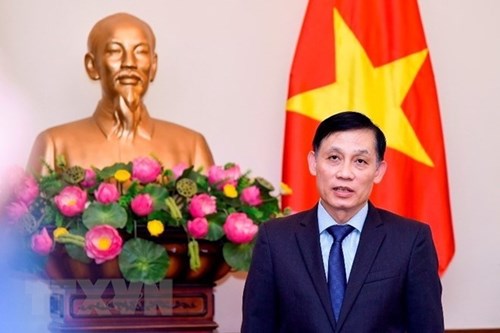During an interview granted to the press, Trung said the Emperor, Empress, royal family, and government of Japan welcomed President Quang and his spouse, the only State guests this year, in the highest rituals to a head of State with all respect.
During the stay, the Vietnamese President held talks with Prime Minister Shinzo Abe, issued the Vietnam – Japan Joint Statement, met with Speaker of the House of Representatives and Speaker of the House of Councilors.
He also met leaders of Japanese political parties, held dialogues with Japanese economic organizations, and delivered a speech at the investment promotion conference with over 700 firms taking part.
    |
 |
|
Deputy Foreign Minister Le Hoai Trung |
The leader visited Gunman prefecture and attended a banquet celebrating the 45th anniversary of Vietnam-Japan diplomatic ties with the participation of the Emperor and Empress.
During talks and meetings, both sides issued a joint statement that defines major orientations for bilateral ties in the new development period.
They signed and exchanged four cooperation agreements in the fields of environment, construction and training, 17 investment licenses and cooperation deals between businesses and localities in aviation, retail, agriculture, information technology, energy, support industry worth nearly USD 2 billion.
About outstanding outcomes of the visit, Trung said the visit has strengthened high political trust, tightened close ties with the Japanese royal, government, parliament, political and economic circles.
Emperor Akihito, PM Abe, leaders of parliament, politicians and economists affirmed that they consider Vietnam an important partner in their country’s policy towards the region. They expressed readiness to cooperate for the sustainable development of Vietnam.
The two countries’ leaders vowed to push the bilateral extensive strategic partnership into a new development period, and maintain regular exchanges with high-level leaders.
They agreed to intensify exchanges between the two ruling Parties and legislatures, reinforce cooperation in national defense-security and maritime security, and defense technology and equipment.
The Japanese side vowed to continue assisting Vietnam in improving the capacity of legal enforcement at sea, search and rescue, peacekeeping mission, overcoming war consequences via war landmine clearance and provide support for Vietnamese victims of bombs, mines and dioxin.
They promised to step up joint work in human resources development, science-technology, environment, health care, education, culture and locality-to-locality cooperation.
The two sides committed to launching negotiations on the agreement on judicial assistance in criminal matters and the agreement on the transfer of sentenced persons.
Vowing to support Vietnam in administrative reform, Japan announced official development assistance worth nearly 150 million USD to improve vocational training capacity, and pledged to step up people-to-people exchange via welcoming more Vietnamese graduates and high-quality workers.
In order to double 2014’s two-way trade value by 2020, the two nations will improve the efficiency of economic cooperation mechanisms and make it easier for Japanese oranges and Vietnamese litchis and longans to enter each other’s market.
Japanese economists spoke highly of Vietnam’s political stability, socio-economic performance, investment environment and human resources.
They highlighted that Vietnam is an attractive business destination in ASEAN, and considered Vietnam a trustworthy and promising partner of Japan. They added that 70 percent of Japanese firms operating in Vietnam want to expand and do long-term business, invest in the equitisation of State-owned enterprises, build infrastructure, and partner in energy, high-tech agriculture and building an automated society.
Hosts and guest vowed to offer mutual liaison at regional and global forums for peace, cooperation and development in the region and the world.
They attached importance to facilitating trade freedom and promoting the enactment of the Comprehensive and Progressive Agreement for Trans-Pacific Partnership, and expressed support for peace, stability and denuclearization on the Korean Peninsula.
Leaders also declared mutual support for each other to run for a non-permanent member of the United Nations Security Council, with Vietnam for the 2020-2021 tenure and Japan for the 2023-2024 tenure.
Speaking highly of Vietnam’s role in the region, Japan affirmed support to Vietnam’s stance on the East Sea issue.
In conclusion, Trung believed that 2018 will start a new, effective and practical development period of the Vietnam – Japan extensive strategic partnership.
Source: VNA